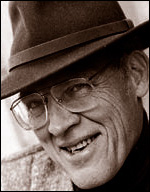You reached this page through the archive. Click here to return to the archive.
Note: This article is over a year old and information contained in it may no longer be accurate. Please use the contact information in the lower-left corner to verify any information in this article.
Writing students find, share their voice in small-town newspapers
September 2, 2002
When Associate Professor of English Jim Heynen teaches creative writing at St. Olaf College, he likes to recite one of his favorite maxims: "At any point in a story, anything can happen." That's commandment No. 11 from Heynen's list of hints for fiction writers.
 St. Olaf Associate Professor of English and writer-in-residence Jim Heynen waived final exams for those creative writing students whose work was published on the editorial pages of an off-campus newspaper. |
Heynen, writer in residence at St. Olaf and author of 17 books of fiction and poetry, presented a challenge last spring to his first-year class on "Writing to Change the World." Anyone who could get an opinion piece published on the editorial pages of an off-campus newspaper with a circulation of more than 1,000 subscribers would be exempted from taking the final exam.
Eight of the 19 students took on the mission and succeeded in having articles published in newspapers from Northfield, Minn., to Wyoming, Colorado and Arizona.
The project had as much to do with networking and public relations as it did with thoughtful journalism. Students with "connections" were clearly at an advantage. "Whom you know has little to do with how well you write," Heynen says, citing the 17th tip from his list of commandments for writers. "Who you know can have much to do with whether you get published. But how well you write has much to do with who would want to know you."
In Heynen's case, the readers who know him best often are elementary and middle school students. Books such as The One-Room Schoolhouse, Being Youngest and Fishing for Chickens: Short Stories About Rural Youth have been used in classrooms across the country. He calls on memories from his own upbringing on a farm in northwest Iowa, where, as the youngest of three children, Heynen was "the dreamer, the prematurely wise and, of course, the smart-aleck."
Beyond the sense of safety and neighborliness, small-town life has other advantages, Heynen told his recent St. Olaf class. Students from small towns were more likely to get their essays published in local papers, where an editor may have known them or their parents. The exercise "made students from larger cities have to contemplate the nature of privilege, advantage and connections," Heynen says.
Caleb Buecksler '05 had an article titled "The Maltreatment of the Mentally Ill in American Society" published in the Hayfield Herald. "The ill-effects of our society's mis-treatment of its mentally ill is becoming a thorn in our nation's side," he wrote. "There are simply not enough resources available to give the mentally ill the help that they deserve. . . . If America were to properly assist its mentally ill in both communities and prisons, crime would be reduced and fewer individuals would become imprisoned."
Another student, Anne Rzepecki, even got a piece published in a large-circulation daily, the Minneapolis-based Star Tribune, after the school year ended.
All in all, Heynen pronounces the experiment a success. In fact, he'll repeat it this fall, after Star Tribune op-ed editor Eric Ringham visits the "Writing to Change the World" class. "I think the exercise awakened students to the fact that there are public venues for their writing outside the immediate college community," Heynen says. "For some, it also had the sobering impact of making them see what it means to have their ideas public and therefore vulnerable to scrutiny and criticism.
"They learned that having their name in print is exciting but also risky."
